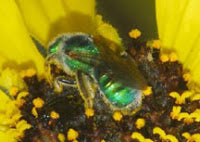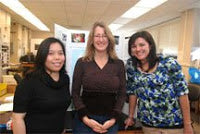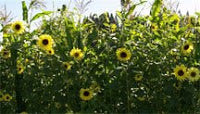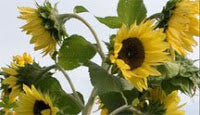
Citizen Science With Sunflowers
We love our partnership with The Great Sunflower Project. This fascinating and ambitious "citizen science" project was founded by Dr. Gretchen LeBuhn, a conservation biologist and associate professor at San Francisco State University who studies the effects of climate change on bee communities. The Great Sunflower Project collects data provided by volunteers to help understand what is happening to the bee pollinators in all the different bee species, focusing on urban and semi-urban areas.Here's how Dr. LeBuhn describes the background of the project for participants:
 "We know that pollinators are declining in certain wild and many agricultural landscapes. However, little is known about urban pollinators. Because natural habitats are uncommon in urban landscapes, they may not provide enough resources to support viable pollinator communities. However, if other habitats, such as urban gardens and restored areas, are sufficiently connected to natural habitat, then native populations may thrive.
"We know that pollinators are declining in certain wild and many agricultural landscapes. However, little is known about urban pollinators. Because natural habitats are uncommon in urban landscapes, they may not provide enough resources to support viable pollinator communities. However, if other habitats, such as urban gardens and restored areas, are sufficiently connected to natural habitat, then native populations may thrive.
 "We know that pollinators are declining in certain wild and many agricultural landscapes. However, little is known about urban pollinators. Because natural habitats are uncommon in urban landscapes, they may not provide enough resources to support viable pollinator communities. However, if other habitats, such as urban gardens and restored areas, are sufficiently connected to natural habitat, then native populations may thrive.
"We know that pollinators are declining in certain wild and many agricultural landscapes. However, little is known about urban pollinators. Because natural habitats are uncommon in urban landscapes, they may not provide enough resources to support viable pollinator communities. However, if other habitats, such as urban gardens and restored areas, are sufficiently connected to natural habitat, then native populations may thrive.
By finding a way to track and value the goods and services provided by natural ecosystems, we will find a future in which conservation is not a luxury but a guiding principle of daily decision-making throughout the world. The Great Sunflower Project is a first step. The data collected by home gardeners provides insight into how our green spaces in the urban, suburban and rural landscapes are connected as well as shedding light on how to help pollinators."
Here’s how The Project works: interested individuals can volunteer and sign up on The Great Sunflower Website, agreeing to collect data on bees attracted to their garden sunflowers. I'm pleased and proud to have created a special packet to ensure growing success; Lemon Queen Sunflower is the preferred Project variety. As seeds are sown, grow and flower, all volunteer ‘citizen scientists’ observe and report on the bees that visit them, using standardized data sheets they obtain from and return return to the Project for analysis.
 Over 50,000 American and Canadian volunteers ranging from preschoolers to master gardeners and from rural, suburban and metropolitan locations have participated! The project has developed wide range of data about urban bee populations that would not otherwise be available: "We have grown a ‘virtual’ community of teachers, community gardeners, nature center staff, beekeepers, pollinator enthusiasts, retirees, homeschooling groups and parents interested in participating in a project with their children. If everyone plants seeds this year, we will have sunflower samples from the Arctic Circle to the tip of Florida and west to Hawaii and east to Puerto Rico!"
Over 50,000 American and Canadian volunteers ranging from preschoolers to master gardeners and from rural, suburban and metropolitan locations have participated! The project has developed wide range of data about urban bee populations that would not otherwise be available: "We have grown a ‘virtual’ community of teachers, community gardeners, nature center staff, beekeepers, pollinator enthusiasts, retirees, homeschooling groups and parents interested in participating in a project with their children. If everyone plants seeds this year, we will have sunflower samples from the Arctic Circle to the tip of Florida and west to Hawaii and east to Puerto Rico!" In addition to personally contributing in building an important database about bees, participants can really learn about both honey bees and lesser-known native species. Besides, it's really fun to be part of a big effort like this! I'd like to encourage everybody to go to The Great Sunflower Project, sign up and participate!
In addition to personally contributing in building an important database about bees, participants can really learn about both honey bees and lesser-known native species. Besides, it's really fun to be part of a big effort like this! I'd like to encourage everybody to go to The Great Sunflower Project, sign up and participate!Here’s how The Project works: interested individuals can volunteer and sign up on The Great Sunflower Website, agreeing to collect data on bees attracted to their garden sunflowers. I'm pleased and proud to have created a special packet to ensure growing success; Lemon Queen Sunflower is the preferred Project variety. As seeds are sown, grow and flower, all volunteer ‘citizen scientists’ observe and report on the bees that visit them, using standardized data sheets they obtain from and return return to the Project for analysis.
 Over 50,000 American and Canadian volunteers ranging from preschoolers to master gardeners and from rural, suburban and metropolitan locations have participated! The project has developed wide range of data about urban bee populations that would not otherwise be available: "We have grown a ‘virtual’ community of teachers, community gardeners, nature center staff, beekeepers, pollinator enthusiasts, retirees, homeschooling groups and parents interested in participating in a project with their children. If everyone plants seeds this year, we will have sunflower samples from the Arctic Circle to the tip of Florida and west to Hawaii and east to Puerto Rico!"
Over 50,000 American and Canadian volunteers ranging from preschoolers to master gardeners and from rural, suburban and metropolitan locations have participated! The project has developed wide range of data about urban bee populations that would not otherwise be available: "We have grown a ‘virtual’ community of teachers, community gardeners, nature center staff, beekeepers, pollinator enthusiasts, retirees, homeschooling groups and parents interested in participating in a project with their children. If everyone plants seeds this year, we will have sunflower samples from the Arctic Circle to the tip of Florida and west to Hawaii and east to Puerto Rico!" In addition to personally contributing in building an important database about bees, participants can really learn about both honey bees and lesser-known native species. Besides, it's really fun to be part of a big effort like this! I'd like to encourage everybody to go to The Great Sunflower Project, sign up and participate!
In addition to personally contributing in building an important database about bees, participants can really learn about both honey bees and lesser-known native species. Besides, it's really fun to be part of a big effort like this! I'd like to encourage everybody to go to The Great Sunflower Project, sign up and participate!



